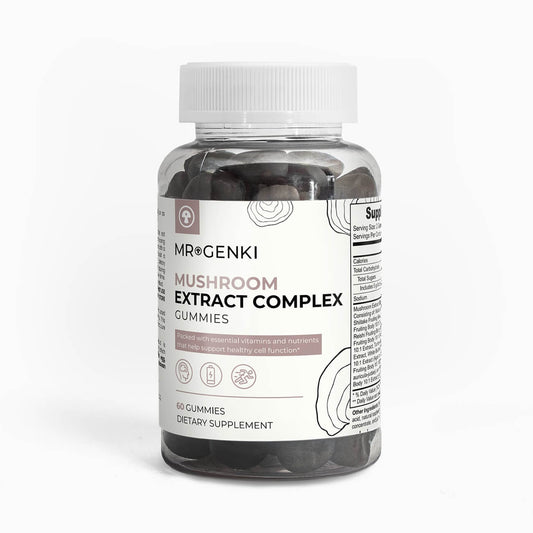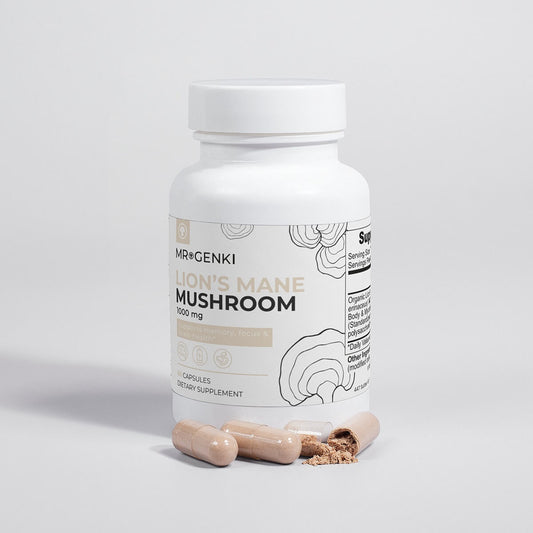Lion's Mane mushroom, a unique superfood, has been revered in ancient medicine and is gaining traction in modern wellness practices. Its distinctive appearance and profound health benefits make it a subject of increasing interest among health enthusiasts.
Key Takeaways
| Benefit | Description |
|---|---|
| Neuroprotection | Supports brain health and nerve regeneration |
| Cognitive Enhancement | Improves memory and focus |
| Mental Health Support | Alleviates anxiety and depression |
| Immune Boosting | Enhances the immune system |
| Digestive Health | Benefits gut health |
| Anti-inflammatory and Antioxidant | Reduces inflammation and oxidative stress |
| Cancer Prevention and Treatment | Potential anti-cancer properties |
| Diabetes Management | Helps regulate blood sugar levels |
| Heart Health | Supports cardiovascular wellness |
| Skin Health | Promotes healthier skin |

1. Neuroprotective Properties of Lion's Mane
Lion's Mane mushroom is distinguished for its remarkable neuroprotective qualities. The secret lies in its bioactive substances, hericenones and erinacines, which are known to stimulate the growth of brain cells.
These compounds play a pivotal role in neurogenesis, the process of forming new neurons, which is crucial for maintaining cognitive health.
Scientific studies have illuminated the potential of Lion's Mane in neuroregeneration. A notable study, as reported on PubMed, demonstrates its ability to stimulate nerve growth factor (NGF) synthesis. NGF is vital for the survival and maintenance of nerve cells, including those in the brain.
The implications of these properties are significant, especially in the context of neurodegenerative diseases like Alzheimer's and Parkinson's.
Regular consumption of Lion's Mane could potentially slow or reverse cell degeneration in the brain, offering a beacon of hope in the field of neurodegenerative research.
Furthermore, this mushroom's neuroprotective effects extend to repairing nerve damage, indicating its utility in treating injuries or illnesses that affect the nervous system. This aligns with traditional uses in Eastern medicine, where Lion's Mane has been utilized for centuries to enhance brain and neurological health.
The neuroprotective properties of Lion's Mane mushroom, backed by scientific research, make it a promising natural agent for cognitive enhancement and neurological health maintenance.
2. Boosting Cognitive Function
This mushroom is a natural cognitive enhancer. The cognitive-enhancing benefits of Lion's Mane are not only limited to memory and focus but extend to overall brain function improvement.
Lion's Mane has been observed to positively impact mental agility, helping individuals to think more clearly and process information more efficiently. The neurotrophic properties of Lion's Mane play a crucial role in this, as they support the development and functioning of neurons, which are essential for cognitive processes.
Additionally, studies suggest that regular consumption of Lion's Mane can lead to sustained cognitive improvements, making it a valuable supplement for individuals seeking to enhance their mental performance over the long term.
3. Alleviating Symptoms of ADHD, Anxiety and Depression
Lion's Mane mushroom's potential in alleviating ADHD, anxiety and depression is closely linked to its impact on brain health.
The bioactive compounds in the mushroom are believed to influence the production of neurotransmitters like serotonin and dopamine, which play a key role in mood regulation. This effect can provide a natural, gentle approach to balancing emotional states.
Furthermore, the anti-inflammatory properties of Lion's Mane might also contribute to its mental health benefits, as inflammation has been linked to mood disorders.
Daily dose of Lion's Mane could, therefore, offer a holistic approach to managing symptoms of anxiety and depression.
4. Immune System Boost
Lion's Mane mushroom is notable for its immune system enhancing properties. It contains polysaccharides, such as beta-glucans, which are known to modulate the immune system.
These components help in stimulating the activity of immune cells like macrophages and natural killer cells, which are essential for defending the body against pathogens.
Additionally, Lion's Mane's ability to improve gut health indirectly supports the immune system, as a significant portion of the body's immune system is located in the gut.
This dual action, both direct and indirect, makes Lion's Mane a potent ally in strengthening the body's natural defenses.

5. Gut Health Support
Lion's Mane mushroom's support in digestive health extends beyond basic gut wellness.
It contains natural compounds that help maintain a healthy gut flora, which is essential for optimal digestion and nutrient absorption. The mushroom's anti-inflammatory properties also play a crucial role, potentially soothing inflammatory conditions of the gastrointestinal tract such as gastritis or ulcerative colitis.
Research suggests that Lion's Mane may aid in the repair of gastric mucosa, offering therapeutic benefits for individuals suffering from stomach ulcers. This multifaceted approach to digestive health underscores Lion's Mane's value as a functional food in promoting gastrointestinal well-being.
6. Anti-Inflammatory and Antioxidant Effects
Lion's Mane mushroom stands out for its anti-inflammatory and antioxidant properties. These properties are largely attributed to its high content of antioxidants, which combat oxidative stress and reduce inflammation at a cellular level.
This action is vital in preventing chronic inflammation, a root cause of various diseases such as heart disease, cancer, and autoimmune disorders. Additionally, the anti-inflammatory effects of Lion's Mane may provide relief in conditions like arthritis, where inflammation is a primary concern.
Regular consumption of this mushroom could, therefore, play a crucial role in maintaining overall health and preventing inflammation-related health issues.
7. Potential in Cancer Prevention and Treatment
The potential of Lion's Mane mushroom in cancer prevention and treatment is an area of growing interest in medical research. Its bioactive compounds have been shown to have anti-tumor effects, particularly in studies conducted on cell cultures and animal models.
These compounds may inhibit the proliferation of cancer cells and induce apoptosis, which is the programmed death of cancer cells.
Moreover, the immune-boosting properties of Lion's Mane can be beneficial in supporting the body's natural defense against cancer development.
While further research, particularly in human trials, is needed, the current findings suggest a promising role for Lion's Mane in cancer-related therapies.

8. Managing Diabetes Symptoms
Lion's Mane mushroom has shown potential in managing diabetes symptoms, particularly through its influence on blood sugar levels.
The compounds in the mushroom can help in reducing blood glucose, thereby aiding in the control of diabetes. This effect is particularly beneficial in type 2 diabetes, where insulin resistance is a major concern.
Additionally, Lion's Mane's antioxidant properties may help in mitigating oxidative stress associated with diabetes complications.
Regular consumption of Lion's Mane could therefore be a supportive natural measure in diabetes management, complementing traditional treatment methods.
9. Promoting Heart Health
Lion's Mane mushroom is beneficial for heart health in several ways. It contains compounds that may help lower high cholesterol levels, a significant risk factor for heart disease.
These cholesterol-lowering effects are attributed to the mushroom's bioactive compounds that can inhibit the synthesis of cholesterol in the liver.
Furthermore, Lion's Mane has been found to have anti-thrombotic properties, which reduce the risk of blood clots, further promoting cardiovascular health.
By addressing these key factors, Lion's Mane can be an effective natural supplement for maintaining a healthy heart and preventing heart-related conditions.
10. Skin Health Benefits
Lion's Mane mushroom also offers notable benefits for skin health. Its antioxidant properties play a crucial role in protecting the skin from oxidative damage caused by free radicals, which can lead to premature aging.
Additionally, the anti-inflammatory effects of Lion's Mane can be beneficial in reducing skin inflammation, which is a key factor in conditions like acne and eczema.
The mushroom's ability to enhance overall health, including gut health, can also positively impact skin appearance, as a healthy gut is often reflected in clearer, more radiant skin.
Incorporating Lion's Mane into a regular diet or skincare routine could contribute to healthier, more vibrant skin.
Conclusion
In conclusion, Lion's Mane mushroom stands out as a versatile and potent natural supplement offering a wide array of health benefits.
From enhancing cognitive functions and mental health to bolstering immunity, digestive wellness, and cardiovascular health, its multifaceted properties align with both traditional uses and modern scientific findings.
Its potential in cancer therapy and diabetes management, along with skin health benefits, further amplifies its significance in the health and wellness realm.
Exploring Lion's Mane Mushroom can be a step towards embracing a more natural approach to health, backed by ancient wisdom and contemporary research.













